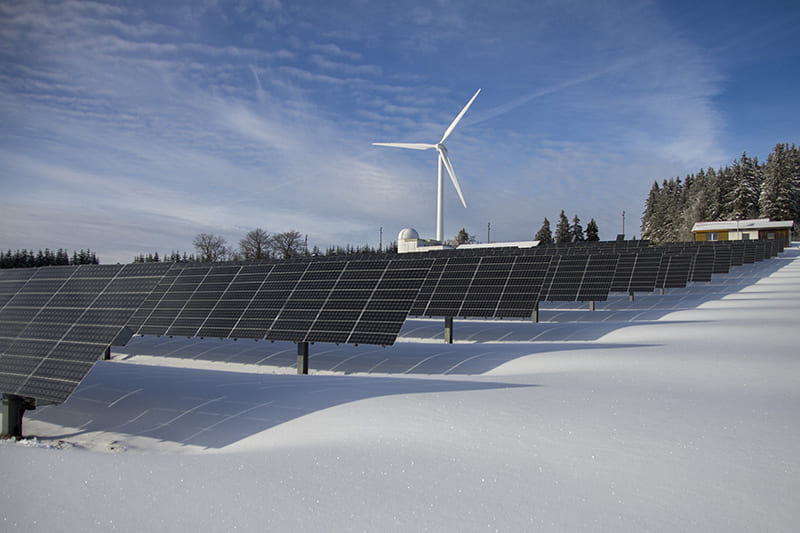Six advantages of green energy and microgeneration for companies
9 January 2024
Most companies rely partly or entirely on non-renewable fuels, such as coal, oil, and natural gas, to heat and cool their facilities and to keep the equipment running. Purchasing energy from a utility company that creates power by burning these types of fuel increases pollution and expands a company’s carbon footprint.
It is challenging to move entirely away from non-renewable energy sources. However, reducing your organization’s reliance on fossil fuels is entirely plausible and will benefit both the environment and your company. Here are six advantages of choosing green energy and adding microgeneration to your organization’s energy mix:
1. Lower energy expenses
Most business leaders are constantly seeking new ways to grow their businesses and cut costs. One of the best ways to generate savings that is often overlooked is incorporating green energy sources into your procurement strategy or generating a portion of your energy on-site with solar panels or turbines. Apart from green energy being generally cheaper, many locations have introduced taxes or incentives to encourage companies to go green.
For example, in 2019 Canada implemented a carbon-pricing system that taxes both fossil fuels and carbon emissions. While each province or territory can create their own regulations and standards, they must meet or exceed the federal program standards. In early 2023, this tax amounted to a tax of at least $65 for each tonne of CO2 a company generates, and the tax is set to increase in coming years. In many industries, this cost could quickly add up and eat away at your bottom line.
The savings continue beyond that. Non-renewable energy gets more scarce every day. That means every time a manufacturing facility powered by fossil fuels makes a product, there’s slightly less of that resource, be that coal, oil, or natural gas. It stands to reason that as energy sources become more scarce, they will also become more expensive. Switching now to renewable energy sources insulates you from some of those possible price increases. That means you start saving immediately, and those savings will most likely accelerate over time.
2. Long-term planning and access
As mentioned above, in the not-too-distant future, non-renewable energy resources may become scarce and increasingly expensive. When consumer demand outpaces supply, supply chain issues result in shortages and delays.
If your entire operation relies on energy from those limited resources, you may struggle to keep the lights on, create products, and service or communicate with customers. Green energy doesn’t face those challenges. If you choose to go down the microgeneration road, no one will be competing with you for the power generated by the wind turbine located behind your warehouse. Consequently, your doors stay open, and your employees continue to work, even if your fuel supplier runs out of gas or oil.
3. Reliability
If you want to increase reliability, diversifying energy sources is the solution. Operating entirely on grid-purchased power leaves you exposed to extreme weather events, such as storms and blizzards, heatwaves and wildfires, which often cause power outages. They always lead to your equipment sitting idle, which in turn affects the level of customer service you can deliver. Adding microgeneration to your energy mix, on the other hand, can help prevent costly service disruptions.
Green energy sources offer a naturally diversified power source. A layered strategy where you maintain a grid tie and utility contract while also getting part of your energy from other sources or generating green energy on-site means you aren’t at the whim of only one source. It allows you to keep operating while your competitors may be sitting in the dark.
4. Positive and increasing return on investment
There is an up-front investment if you want to generate green energy on-site. You’ll need to purchase the equipment to leverage wind, solar, hydro, or geothermal energy. There are also costs to ensure your system is wired correctly, and you may want to consider buying batteries to store power for later use. It’s not an insignificant cost.
However, you can begin seeing savings as soon as your green system goes online. Before long, those lower expenses will pay for your system. The return on investment for green energy means more money back in your pocket and your company’s budget.
5. Environmental impact
Until now, we’ve discussed concrete advantages like saving money and avoiding service disruptions. Green energy also allows you to sleep better at night. You can feel good about operating a business that isn’t harming the environment or making life harder for future generations. Every step to decrease your carbon footprint by making your company’s operations more green means less negative environmental impact. Doing your part to create a healthier environment is an advantage to green energy you shouldn’t ignore.
6. Community support
The wind turbine on your property clearly signals your neighbours that you are doing your part for the environment. Not only will that make you a more valued community member, but it can also bring in new business. Individual customers or companies trying to “go green” themselves will gravitate toward like-minded businesses. To those making environmentally conscious buying decisions, your green energy efforts are like a giant billboard that says, “Shop here.”
Green energy’s benefits for your company are numerous. You’ll save money, insulate your business from outages, and attract new clients. You’ll also position your business as forward-thinking and community-minded. These advantages of green energy make it well worth considering for your business’s future. If you need help determining the best ways to integrate green energy into your business, commercial energy consultants can help you evaluate the options.




